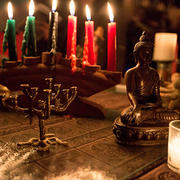
Religious leaders from the HDS community share spiritual resources for hard times
The COVID-19 pandemic both engenders and accentuates the greatest challenges of the human condition: loneliness, loss, suffering, and mortality. Confronted with these, the devout and the irreligious alike hunger for connection to something greater than themselves—and for narratives that put unprecedented events into the context of human experience.
As part of its response to this crisis, Harvard Divinity School reached out to members of its community—faculty, affiliates, and alumni—for perspective and advice. Leaders from each of the world’s largest religious traditions, they share wisdom, practices, and scriptures that enable both believers and nonbelievers to walk through the pandemic.
Enjoying this article? Sign up for the free HDS Current newsletter and get the latest news from Harvard Divinity School, the hub of the study of religion at Harvard University.
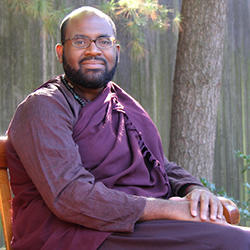 Lama Rod Owens, MDiv ’17: Compassion in the Face of Fear
Lama Rod Owens, MDiv ’17: Compassion in the Face of Fear
A graduate of Harvard Divinity School’s Buddhist Ministry Initiative, Lama Rod Owens is a teacher, activist, and co-author of the book Radical Dharma: Talking Race, Love, and Liberation. For him, the pandemic illustrates “the reality of the world and its potential to be uncomfortable.” He recommends a range of practices—from meditation and prayer to acts of gratitude—for managing the traumas of COVID-19.
“Tonglen or ‘taking and sending’ is a very popular practice that uses the breath. We breathe in the energy of discomfort and breathe out the energy of peace and openness. It is a practice that helps us stay with the energy of discomfort and to relax into it.
“Gratitude practice helps me to remember what I am grateful for and to generate that energy and rest within it as a source of support and care. As times get darker, it is so important that we have intentional practice that reminds us of the good things and that can spark more space in the mind. It is from this sense of space that we can practice resiliency.
“Sympathetic joy is very similar to gratitude practice but in this practice we turn our attention to what sparks happiness for us. We notice this, rest in this energy, and then we imagine offering this happiness to others and in doing so we deepen our capacity to experience happiness while trying to be of benefit to others.
“’Tilopa’s Six Nails’ is a powerful meditation practice that can be very beneficial. It helps me maintain focus on the present moment. It helps me to manage experiences of being overwhelmed.
Don’t recall. Let go of what has passed.
Don’t imagine. Let go of what may come.
Don’t think. Let go of what is happening now.
Don’t examine. Don’t try to figure anything out.
Don’t control. Don’t try to make anything happen.
Rest. Relax, right now, and rest.
“Finally, Shantideva’s prayer is something that I have been practicing with students recently. This prayer helps me to generate compassion in the face of intense fear. It’s a prayer that I think gently reminds us that regardless of what’s happening, we should always try to be of benefit to others.”
May I be a protector to those without protection,
A leader for those who journey,
And a boat, a bridge, a passage
For those desiring the further shore.
May the pain of every living creature
Be completely cleared away.
May I be the doctor and the medicine
And may I be the nurse
For all sick beings in the world
Until everyone is healed.
Just like space
And the great elements such as earth,
May I always support the life
Of all the boundless creatures.
And until they pass away from pain
May I also be the source of life
For all the realms of varied beings
That reach unto the ends of space.
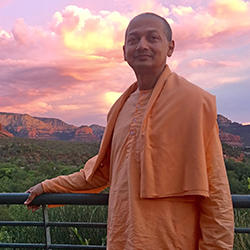 Swami Sarvapriyananda: From Shock to Peace
Swami Sarvapriyananda: From Shock to Peace
One of three Hindu monastics in residence at HDS during the 2019-20 academic year, Swami Sarvapriyananda is a monk in the Ramakrishna order and the spiritual leader of the Vedanta Society of New York. He says that the pandemic makes it impossible for humans to ignore the fact of their mortality. That recognition of death is shocking at first but can lead to a deeper understanding of the nature of life—and, over time, to a sense of peace.
“In our modern culture, we try to delete or erase the fact of death. And all of us face it. But because each of us faces it individually, the others can safely ignore it, and go on, and move on. It's only when there's something like a pandemic, where the whole society is now faced with illness and the possibility of death, then we are shocked.
“The fact is, the body is going to die for everybody. Everybody dies. Throughout history, everybody has died, and the body will go. And we are not the body.
“We are not even the mind, which is subject to ups and downs—depression and elation and joys and sorrows. They have come. These clouds have come into the mind and disappear.
“And we are aware of the depressed mind. We are aware of the peaceful mind. We aware of the curious mind. We are aware of the bored mind. But we are not the mind. It's the panorama of life passing before the radiance, the consciousness, which we are.
“That consciousness in itself is not subject to birth and death, illness or health. That's the body. It's not subject to elation or depression. That's the mind. When we think about it this way, we begin to put a little distance between ourselves—our Self with a capital ‘S’—and the mind.
“So even if there is anxiety, we can see it as an object. Like this pen before me, it’s not me. It's something that I see. It’s the same with the body. Maybe there's a temperature, or a cough, or something. That's also an object. It's not doing too well, but it's not me.“The moment we put a little psychological distance between ourselves and the mind, we immediately find peace, a quietness. And in that space, what happens is the mind also calms down. The mind's natural state is not depression, or anxiety, or fear. More than the external circumstances, it's this sticking to the mind—thinking of ourselves as the mind—which generates so much fear and anxiety.”
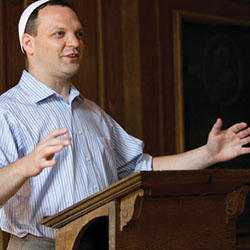
A graduate of MIT, former software executive, and nonprofit leader, Rabbi Jeremy Sher was chaplain at Langley Porter Psychiatric Institute and University of California San Francisco Medical Center before moving to California Pacific Medical Center, where the patients to whom he ministers include those with COVID-19.
He offers prayers for comfort but says it’s also important to acknowledge and make space for the suffering caused by the pandemic without trying to “fix” it.
Our Jewish healing prayer is always available for comfort. I offer "Mi Sheberach" prayers in the hospital often. For communal use, the prayer begins, "May the One who blessed our ancestors, Abraham, Isaac, and Jacob, Sarah, Rebekah, Leah, and Rachel also bless and heal those who are ill."
Not by our own merit, but by the merit of our ancestors who walked close to God, do we invoke God's healing power. Mi Sheberach can be said individually or communally; communally, it conveys healing wishes for each individual as well as a community's commitment to care. It's a time when we are reminded to help those who need help, as we are able.
The Mishnah (Berakhot 9) declares that a person should bless God for good news and should bless God for bad news. For good news or good events, there is a variety of blessings. For bad news, the blessing is "Blessed is the Judge of truth." We have to face the truth of what is. The Mishnah continues, "One who blesses on the bad within the good, or on the good within the bad, behold this is a prayer in vain."
We have a tendency in our culture to try to find silver linings in everything, because we have a fundamental discomfort with tragedy. Optimism has its place, but it's also okay to let bad news be bad. This is why I'm uncomfortable with the "Pandemic" poem that's been going around. It's beautiful as literature, and if the pandemic is for you an opportunity to rest and recenter, congratulations, how wonderful for you—but at UCSF I provide ministry to people dying of this disease. We don't have to whitewash the bad out of our bad news. The pandemic is bad. It's okay to sit with that.
Finally, for a wholesome reminder to wash our hands, I refer you to Psalm 24:3-4.
Who may ascend the mountain of the Lord?
Who may stand in his holy place?
The one who has clean hands and a pure heart,
who does not trust in an idol
or swear by a false god.
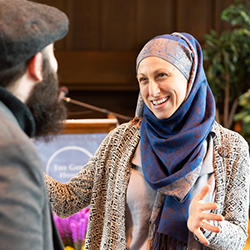 Celene Ibrahim, MDiv ’11: Gratitude and Perseverance in Times of Trial
Celene Ibrahim, MDiv ’11: Gratitude and Perseverance in Times of Trial
A scholar of Islam, an interfaith activist, and a faculty member in the Department of Religious Studies and Philosophy at Groton School, Celene Ibrahim also served as a Muslim Chaplain at Tufts University from 2014 to 2019. She says that the pandemic has encouraged her to focus on gratitude and perseverance not only as attitudes, but also as spiritual practices.
“A piece of wisdom—a ‘hadith’—narrated by a close companion of the Prophet Muhammad known as Ibn Abbas has been on my mind lately:
The Messenger of God, peace and blessings be upon him, said, 'Take advantage of five before five: your youth before your old age, your health before your illness, your riches before your poverty, your free time before your work, and your life before your death.’
“In Islamic teachings, part of showing gratitude for youth, health, provision, leisure, and life itself entails using these blessing for ultimate good. There is a verse of the Qur’an: ‘If you are grateful, I [God] will increase you [in blessing/favor]’ (Q 14:7). The practice is to stay grateful for the blessings that one does have and to put them to use—no matter what the circumstances may be.
“Perseverance, particularly in times of trial, is also a virtue discussed regularly in the Qur’an; those who steadfastly persevere are elevated in ranks. For instance, [the Muslim holy month of] Ramadan is around the corner. We intentionally experience hunger and thirst in order to train our minds, bodies, and spirits to patiently persevere.
“That training for a month every year goes a long way in building up perseverance. This is not a passive, apathetic patience; this practice is about enduring something difficult with a spirit of gratitude and with a sense of community unity.”
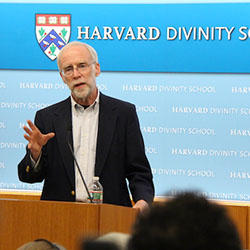
Parkman Professor of Divinity Frank Clooney, is a leading thinker in the developing field of comparative theology. A scholar of the Sanskrit and Tamil traditions of Hindu India, Clooney is also a practicing Jesuit priest who received the Lifetime Achievement Award from the Catholic Theological Society of America in 2017. He notes that the COVID-19 pandemic coincides with Christian and Jewish holy seasons—and that both traditions have a lot to say about hope in the midst of suffering, sickness, and death.
“These moments of extreme pandemic are now happening in the same time as we mark the death of Christ, the remembrance of the Passover, the flight from Egypt, the crossing of the Red Sea. These potent symbols are coming together.
“In the Christian story, the narrative of death and resurrection can be rephrased as wisdom or advice for people who don't want to commit to being Christian or don't want to come to church or any of that. It’s the understanding that we are finite beings and that even when there's no pandemic we live only a certain number of years and then we're gone. However painful it may be to strip away the stories and the progress and the ‘busy-ness’ and say, ‘I see myself in April 2020 under these constraints and concerns,’ there is an abiding peace in the rediscovery of the moment in which we’re living. It’s the realization that we are more than this. This is not the end of our story.
“To live by this kind of hope is not just saying, fancifully, ‘I hope things get better.’ It’s a deep understanding that, whatever the difficulty of the moment, if we face it and don’t run, we will pass through. To echo the Passover feast, we shall leave the slavery of Egypt and cross the Red Sea.
“I know it sounds like I'm in church, but there's a powerful sense of the basic metaphors there, even if you don't celebrate Passover or Easter. The message is ‘Don’t be afraid to be yourself in this situation now because in the end it will give you life.’”
—by Paul Massari
Editor’s Note: HDS reached out to leaders of other faith traditions but at press time were still waiting for responses. This article will be updated as responses arrive.
